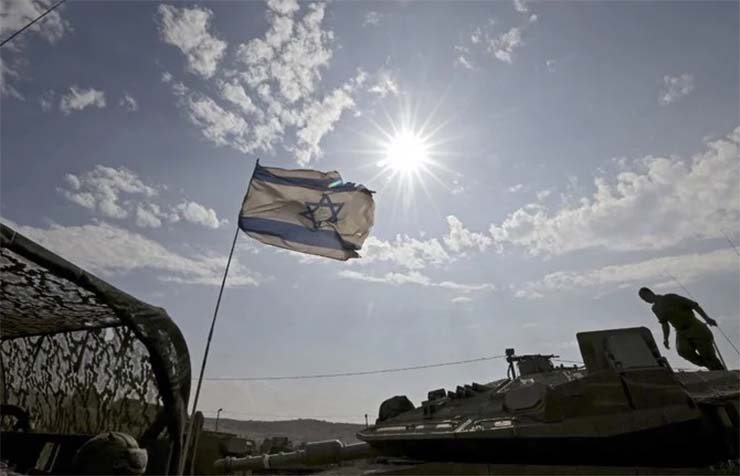
Tel Aviv: Israel, according to foreign media has intensified its attacks aimed at foiling Iran’s new major effort to create a massive military capability in Syria and Lebanon, not only by its local proxies, but by deploying advanced weapon systems operated by Iranians. Israel has a bank of Iranian targets in Syria and they are according to Middle Eastern sources under constant surveillance. Moreover, continued attacks on these Iranian targets that may result in death of Iranians may force Tehran to retaliate, added sources.
The Israeli defence establishment in recent weeks expressed concerns related to the new cooperation between Moscow and Tehran that has been formed after the Iranians agreed to supply big numbers of armed UAVs to the Russian army fighting in Ukraine. Until recently, Moscow sent signals to Iran that it should “dilute” the presence of its proxies in Syria. Now, according to Israeli defence sources that situation has changed and the Iranians feel free to get a stronger foot hold in Syria, based on the fact that Tehran assists the Russians in Ukraine by selling large numbers of armed UAVs.
The newly built relations with Russia gives Iran the backing to be more active not only in Syria. Maj Gen Aharon Haliva, the head of IDF intelligence, has stated that Iran has recently considered planning a terrorist strike during the ongoing. The General talked on Iran in a conference organized by the Israeli Institute for National Security Studies (INSS). The IDF intelligence chief also said that Iran will likely soon carry out at least a symbolic enrichment of uranium to the 90% weaponized level. He predicted that the world will soon be put to the test like never before.
“The Islamic Republic has never dared to go beyond the point at which uranium can be enriched for use in weapons.”
According to foreign media, Israel has intensified its attacks on Iranian related targets in Syria in areas that have never been targeted before. Al Jazeera on November 19 reported that Israeli jets flying over the Mediterranean targeted military posts in central and coastal Syria. The Syrian Observatory for Human Rights, a British-based war monitor, said the attacks were aimed at pro-Iranian groups in the provinces of Homs and Hama, hitting weapons and ammunition sites. The Syrian Observatory also said that Israeli forces targeted a Syrian air defence battery in Latakia province.
Prof Uzi Rabi, an Israeli expert on Middle Eastern issues, said that Iran taking full advantage of the new “friendship” with Russia is expanding its military presence in Syria. Rabi revealed that one of the targets attacked on Saturday, November 19 was an Iranian installation focused on making the Iranian missiles in Lebanon more accurate. “The Ukraine war made Iran a very important ally of Russia. They supplied the Russians with armed UAVs and now are going to transfer production capabilities to Russia,” he added.
Middle Eastern sources said that the Israeli attacks on the weekend targeted sites of the Syrian Navy that Iran uses for its needs and in addition an Iranian intelligence facility that strengthens Tehran’s foothold on the Syrian coast was attacked. Israeli defence sources said that it should be noted that unlike in prior attacks attributed to Israel, the targets attacked last weekend were not convoys of weapons systems on their way from Iran to Lebanon via Syria but Syrian military installations. Iran has enhanced its effort to perform the master plan designed by Major General Qassem Soleimani, who was the head of Iran’s Quds Force, added Israeli defence sources.
On January 3, 2020, the US military conducted a drone strike near Baghdad International Airport that killed Qassem Soleimani, the leader within the Iranian military of the Quds Force of the Islamic Revolutionary Guard Corps (IRGC).
Brig General (Ret.) Amos Gilead, said that the Iranians are making huge efforts to perform this master plan based on creating anti-Israel bases in countries that have borders with Israel. “This program is based on deploying Iranian made weapons systems like ballistic missiles in countries like Syria and Lebanon and launch them when Teheran gives the order like the Houthi rebels in Yemen do while attacking Gulf states.”
Iran has stepped up its ballistic missiles program with massive help from North Korea. In recent months this cooperation has been enhanced and exchange of missile scientists between North Korea and Iran was detected, according to Israeli defence sources. Some Iranian ballistic missiles are based on North Korean technology and the Iranians are developing new versions. Only recently they displayed a new missile, dubbed Rezvan that they claim has a range of 1400 km.
Dr Alon Levkowitz, an Israeli expert on North Korea said that the Iranians need the help of North Korea for their military nuclear program. “There are indications that North Korea performed some tests related to the Iranian program. Iran is paying for these tests and that helps North Korea to further develop its long range ballistic missiles program. Iran pays large sums and gets North Korean help.”
A recent report in the Saudi Al-Hadath news outlet also points to the growing involvement of Iran in Syria and the involvement of North Korea in making Iranian weapons more lethal. According to this report the Hezbollah is storing hundreds of missiles carrying a toxic chemical payload at a warehouse in Al Qusayr, near the Lebanese-Syrian border, the Saudi Al-Hadath news channel reported on Sunday, November 20.
According to the report, the missiles, which include 110 Fajr missiles and more than 300 Fateh missiles, are all carrying the deadly chemical thionyl chloride.
Sources informed Al-Hadath that experts from North Korea injected the toxic chemicals into the missiles under the supervision of an Iranian national and expert specializing in chemical weapons, identified as Qassem Abdullah Massoudyan.








